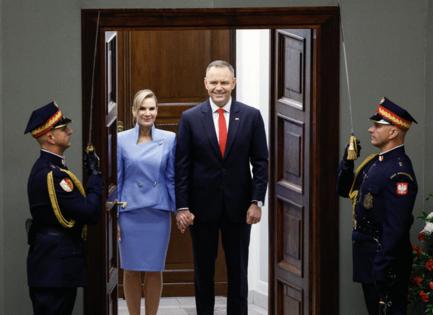Poland's next political battle starts as new president takes office
Published in News & Features
Donald Tusk returned to power in Poland to great anticipation at home and among European Union allies a little over 18 months ago. Now another awkward cohabitation between the prime minister and head of state threatens to create more obstacles for his struggling government.
Karol Nawrocki, the nationalist outsider who scored a shock victory in June’s runoff for president, was inaugurated on Wednesday, setting up a battle with Tusk’s pro-E.U. administration. Instead of securing a long-awaited ally, the government is now preparing for an opponent in the presidential palace again.
Backed by the Law & Justice party that Tusk ousted from government, Nawrocki is expected to wield his ability to block legislation. While the role of president is largely ceremonial, Tusk’s coalition doesn’t have a big enough majority in parliament to overturn a veto on issues such as abortion rights and measures to tackle the budget deficit.
Tusk may find Nawrocki to be an even tougher rival than predecessor Andrzej Duda, who is also a Law & Justice ally, said Agnieszka Kasinska-Metryka, professor of political science at the Jan Kochanowski University of Kielce. Nawrocki’s strong conservative beliefs and eagerness to forge his own path as a nationalist leader could make for an unpredictable presidency, she said.
During the election campaign, Nawrocki openly courted the far right as he sought to win enough support to beat Rafal Trzaskowski, the mayor of Warsaw and the governing Civic Platform’s pick for president.
With no prior background in high political office, Nawrocki is still building his credibility, so from the beginning “he would like to be seen in the media as a strong fighter for what he believes,” said Kasinska-Metryka. “The most interesting issue for me is how long he’ll be loyal to Law & Justice.”
What’s sure is that a clash of two very different politicians with two very different visions for Poland lies ahead.
Nawrocki, 42, is a former amateur boxer turned historian who led the Institute for National Remembrance, which investigates Nazi and communist-era crimes. In his inauguration speech, he said his triumph on June 1 was a “clear signal” that Poles want election promises to be fulfilled.
“These elections are a strong message for the entire political class — it’s a message that we can’t continue to govern like this.”
U.S. President Donald Trump praised Nawrocki’s “GREAT WIN” in a social media post on July 24 ahead of the inauguration in parliament, saying it came because “he truly loves the Polish people.”
Tusk, 68, served as president of the European Council in Brussels. He was feted for defeating Law & Justice in 2023 and steering the country back to the European mainstream after years of standoffs over rule of law that threatened Poland’s E.U. funding.
But that victory turned sour when Tusk faced deadlock from Duda, who stymied attempts at judicial reform, while infighting within the governing coalition derailed efforts to improve women’s rights, for example. Now it’s all about whether he can win re-election in 2027 and keep Law & Justice out of power.
“I listened to this speech with calm and hope that in key matters — such as security and the Polish army — we will find common ground for cooperation,” Tusk said as Nawrocki took office. “There is no alternative here. Cooperation is a necessity.”
Foreign Minister Radoslaw Sikorski has said having a prime minister close to the E.U. and a president close to Trump allows Poland to “play on two pianos at once.” But the question is who sets the music, with Nawrocki, for example, opposing NATO and E.U. membership for neighboring Ukraine.
Tusk’s three-way coalition lost its luster even more after the defeat in the presidential election. A mid-July survey by the CBOS pollster showed that 48% of Poles are dissatisfied with the government, the worst showing since it took power. The governing parties, meanwhile, have squabbled over who was to blame for the failure to take the presidency.
After surviving a vote of confidence in parliament, Tusk has scrambled to assert authority over the coalition. He reshuffled his Cabinet into a “team of commandos,” imploring ministers to take quick decisions and lawmakers to vote unanimously on legislation.
Tusk said in July that the shake-up was aimed at “tightening the reins and telling everyone who reports to me in the government: enough pampering and no more jokes.”
For his part, Nawrocki pledged to be an “active” president, ready to announce legislative proposals after he’s sworn in. First among them will be moves to accelerate work on a major new airport and offer further financial support to farmers.
Nawrocki has vowed to veto any attempt to increase taxes. He also said he’d propose a rise in the tax-free allowance if the government fails to deliver on its pre-election promise.
However, with limited fiscal room to maneuver amid a huge boost to defense spending, Tusk said recently that increase was no longer possible. Poland was reprimanded by the European Commission last year for its excessive deficit, which currently is the biggest after Romania. The Finance Ministry’s 2025 economic growth forecast, currently at 3.4%, was reduced twice.
For the government, the next step is to navigate Nawrocki’s first few months as president.
“I don’t think he seriously cares about these proposals being implemented,” Finance Minister Andrzej Domanski said in an interview with public television. “But just about torpedoing the government’s work.”
----------
—With assistance from Maciej Martewicz, Wojciech Moskwa and Piotr Bujnicki.
©2025 Bloomberg L.P. Visit bloomberg.com. Distributed by Tribune Content Agency, LLC.







Comments